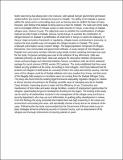Effect of Daadab Refugee Camp and state security in Garissa county, Kenya

View/
Date
2016-10Author
Kanake, Simon Mukindia
Type
ThesisLanguage
enMetadata
Show full item recordAbstract
North-east Kenya has always been very insecure, with special Kenyan government permission needed before any travel is allowed by anyone to Dadaab. The ability of al-shabaab to operate within the camps and in surrounding areas such as Garissa seem to confirm the fears of many Kenyans, who believe that dadaab is being used as a base for militant. The main aim of the study was to investigate effects of refugee camps on state security in Kenya: a case study of Daadab refugee camp, Garissa County. The objectives were to establish the manifestations of refugee induced security threats in Dadaab, Garissa county Kenya, to examine the contribution of refugee presence in Dadaab to proliferation of small arms in Kenya, to assess the adequacy of Kenya`s legal and policy framework in regulating refugees issues contributing to insecurity, to explore the best possible ways of managing the refugee situation in Dadaab. This study employed a descriptive survey research design. The target population comprised of refugees themselves, host communities and government officials. A study sample of 100 refugees and Daadab host community members selected using simple random sampling technique was used for the study. Purposive sampling was used in the selection of key informants. Data was collected primarily via interviews. Data was analysed for descriptive statistics (frequencies, means and percentages and inferential statistics Pearson correlation) with aid of the statistical package for social sciences (SPSS) version 20.0 analysis. The study established that there were indeed security problems at the camp. According to most refugees, most hosts believed that the presence of refugees in itself posed as a security threat in the camp area and the country, and that some of the refugees could be al Shabab militants who have sneaked into Kenya, and that some of the illegally held weapons in circulation were not coming from the Dadaab Refugee Camp. The study also found that the existing legal framework adequately regulates refugees in relation to Kenya`security.According to the findings, possible ways of managing security in Dadaab Camp includes: improving access to water and the efficiency of use, Construction and maintenance of bore holes and water storage facilities, creation of employment opportunities for refugees, spearheading long-term development funding for the region. The finding of the study can be used by all stakeholders involved in the management of the refugee camp and those in security department, who may use such information in guiding policy development or review. From the findings the study concluded that indeed there was high insecurity in the camps and environment surrounding the camp, and specifically Garissa County due to the presence of the camp. Following this the study recommended that the Government of Kenya needs to put in place strategies aimed at enhancing security in Garissa County, such as disarmament of the refugees and thorough enforcement of security policies in place.
Publisher
Africa Nazarene University
